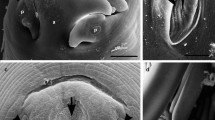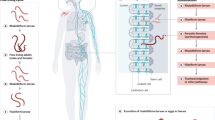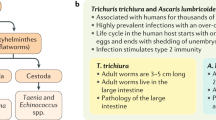Abstract
SINCE Graybill and Smith's discovery1 of the transmission of Histomonas meleagridis, the pathogenic protozoon of enterohepatitis (blackhead) of fowl, by the embryonated egg of the nematode Heterakis gallinæ, a good deal of attention has been given to the hyperparasitism of this nematode. Innumerable experiments have shown that feeding embryonated Heterakis eggs to susceptible birds almost invariably results in a fatal infection of Histomonas; but all attempts to demonstrate the actual organism in the egg have proved futile.
This is a preview of subscription content, access via your institution
Access options
Subscribe to this journal
Receive 51 print issues and online access
$199.00 per year
only $3.90 per issue
Buy this article
- Purchase on Springer Link
- Instant access to full article PDF
Prices may be subject to local taxes which are calculated during checkout
Similar content being viewed by others
References
Graybill, H. W., and Smith, T., J. Exp. Med., 31, 647 (1920).
Shortt, H. E., and Cooper, W., Trans. Roy. Soc. Trop. Med. and Hyg., 41, 427 (1948).
Kudo, R., J. Parasit., 8, 129 (1921).
Dolfus, R., “Parasites des Helminthes” (1946).
Tyzzer, E., Proc. Amer. Acad. Arts and Sci., 69, 189 (1933).
Author information
Authors and Affiliations
Rights and permissions
About this article
Cite this article
DESOWITZ, R. Protozoan Hyperparasitism of Heterakis gallinæ. Nature 165, 1023–1024 (1950). https://doi.org/10.1038/1651023b0
Issue Date:
DOI: https://doi.org/10.1038/1651023b0
Comments
By submitting a comment you agree to abide by our Terms and Community Guidelines. If you find something abusive or that does not comply with our terms or guidelines please flag it as inappropriate.



